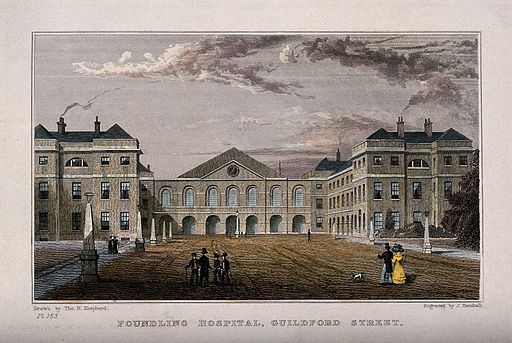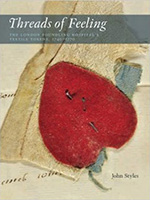

|
Lady Dearing’s MasqueradeLady Dearing became society’s most notorious widow after kissing a stranger at a masquerade but two years later, his memory still haunts her dreams. Sir Jeremy Fairhill has given up hope of finding her, but when he investigates the infamous widow who’s taking in children from London’s Foundling Hospital, his sense of duty clashes with a dangerous passion for the elusive, alluring Lady Dearing. ~ Reviews ~ Buy Ebook: Kindle - Nook - iBooks - Kobo - Inktera ~ Buy Paperback: Createspace - Amazon - Barnes & Noble - Powell’s Books ~ Learn more about the people and places that inspired this story |

Excerpt
“Ah, there you are! You shan’t run away now!”
Livvy turned to see the Turk coming their way from the opposite end of the ballroom. Her partner glanced back, then took her arm and began to lead her on a crooked path through the milling revelers.
The Turk’s loud voice boomed again. “I’ll see your face before the night’s done, you jade!”
The stranger costumed as Death steered her ever faster through the crowd, then pushed her gently against one of the pillars that lined the sides of the ballroom. Shielding her with his body, he pressed her head to his shoulder and draped his cloak around her.
Her heart galloped as his muscular form pressed against hers. First in fear, then, as he did nothing more, an old, familiar heat flowed through her, stoked by the sharp intake of his breath, the betrayal of his unmistakable masculine reaction to their closeness.
It was wonderful and terrifying.
And all he did was hold her. He made no attempt to kiss or fondle her, merely hiding her under his cloak, his body subtly vibrating with his restraint. Nothing more. He demanded nothing more.
Desire flushed her body, and she stiffened. She couldn’t allow this, didn’t want to feel anything like it again. But she didn’t wish to run away either. So they stood for long moments, pressed so close that she could barely distinguish his labored breathing from her own, while desire ebbed and flowed with her fears.
Then he shifted. “I think… he is gone,” he whispered.
She looked up at him, but it was too dark to see his face. His ragged breath spoke of arousal. The heat rose inside her again, like a madness. Recklessly, she stretched upward, on tiptoes and raised her face to him. Another tortured breath, and he lowered his face to hers.
His kiss was shockingly sweet: shy, hesitant, as he pressed his lips almost chastely against hers and stilled his body. As if he guessed what she wanted when she herself had not known. Dreamily, she succumbed to pleasure; she parted her lips and kissed him back, relishing the firm roundness of his lips, the taste of him, the merest hint of wine on his breath.
She gasped as the stranger’s tongue curled around hers. Shocked, she submitted to his slow, tentative exploration, sensing she had but to say the word and he would stop. But she didn’t wish to stop him. She lifted her arms to embrace him, ventured to flick her tongue against his. A shudder ran through his body; he let out a low groan, yet did nothing but kiss her.
Walter had never kissed her like this; she had not known that anyone could kiss so.
Then thoughts of Walter fled. The stranger deepened his kiss; she let out a little moan of pleasure. He pressed against her more closely and she tightened her embrace, whimpering, returning each flutter of his tongue. She felt safe yet lost, feasting yet hungry, helpless with longing for more.
A chill came over her. She froze, then pulled her face away.
She had vowed never to be helpless again.
“I cannot… I am sorry. Let me go,” she whispered.
For a moment Death continued to press her against the pillar, the rhythm of his breath harsh, his body hard.
“Please,” she begged, terror constricting her throat. “Let me go. I should never have come!”
Then he backed away, slowly releasing her. As she slid out from under his cloak, she nearly wept with relief. He was a gentleman after all.
“Forgive me,” he said in one shuddering breath. “Please don’t be frightened. I won’t touch you again if you don’t wish, but please let me—”
His eyes were dark, full of desire and remorse; his voice low and caressing. She was touched, but it was wrong to stay. It was terribly wrong of her to have encouraged him.
“I must go,” she interrupted before she changed her mind. “Please don’t follow me!”

Awards and Reviews
RT Book Reviews Best Regency Romance, 2005
“… the story is poignant, and the admirable way in which Jeremy and Livvy deal with their trials endears them to readers and will have you rooting for them to unite.” — RT Book Reviews (4 and 1/2 stars, TOP PICK)
“The characters of this remarkable tale sparkle with sensitivity, wit, humor, and a genuine quality that will make them stand out in readers’ minds long after the last page is turned…” — Edith Morrison, for Romance Reviews Today
“This was a very well written novel, with great characters and a terrific (and plausible) plot… I’ll definitely be looking for more books by Elena Greene.” — Lynn Lamy, for Rakehell
“This is a SuperRegency from Signet, which means it has a greater page count and more sensuality than your basic Regency, both of which Elena Greene puts to good use in Lady Dearing’s Masquerade… this was a terrific read, and I recommend it.” — Cheryl Sneed, for All About Romance

Audiobook

Story Background
The story begins at a masquerade at the Pantheon Theatre, below. Regency nightlife at its rowdiest!

Livvy and Jeremy are reunited through their concern for children from London’s Foundling Hospital. The Hospital was founded in 1739 by Thomas Coram to address the plight of abandoned children in Georgian London. Jeremy is on the board of governors and in her widowhood, Livvy has taken in some of the children to raise as her own.

From Wellcome Images, a website operated by Wellcome Trust, a global charitable foundation based in the United Kingdom.

Sometimes children were brought who were conceived out of wedlock, as a way to avoid shame and disgrace. Such children were sometimes left with a substantial donation. However, they were more frequently brought by mothers who could not afford to raise them, sometimes servants impregnated by their masters who would lose their positions otherwise. Due to limited space, such mothers had to submit to a lottery to determine if their children would be admitted. Accounts say that the mothers cried bitterly, whether their infants were admitted or not. As a mother, I find it heart-wrenching to think of.
Mothers leaving their infants at the Hospital would leave tokens, often bits of fabric, to help with identification should they later be in a position to reclaim them. Only a few did. There is a wonderful exhibition, now online, called Threads of Feeling, showing examples of those tokens. There’s also a book, which is one of my favorite references.
Although the Foundling Hospital closed its doors in the 1920’s, the Coram charitable organization still serves the needs of vulnerable children and their families.
Much of the story takes place at Livvy’s fictional home, Rosemead Park in the Weald of Kent, one of the most fertile and lovely areas of England. Here’s an image of a garden in Kent that is much like the one I imagined for Rosemead — a sanctuary for Livvy and her beloved foundlings.


Portrait by Oakdale Images
Elena Greene is a a participant in the Amazon Services LLC Associates Program, an affiliate advertising program designed to provide a means for sites to earn advertising fees by advertising and linking to amazon.com.
Copyright © 2015, Elena Greene. All rights reserved.